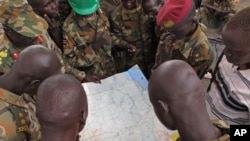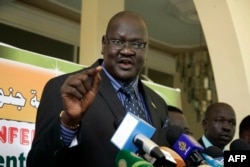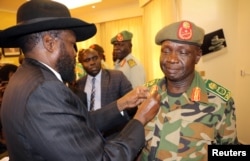South Sudan President Salva Kiir issued several decrees Monday night, creating major army leadership changes.
The army will be restructured into three separate forces: a ground force, an air force and navy units. The changes are in line with resolutions approved in June by the fifth SPLA Command Council Conference. Kiir's restructured army starts with the president at the helm as commander-in-chief.
Under the new hierarchy, the chief of defense forces will have three assistant chiefs to oversee personnel and finance, training and intelligence, and logistics and procurement. Presidential spokesman Ateny Wek Ateny said the council would be the army's supreme decision-making body.
"It will make the SPLA effective because there will be a shared responsibility instead of putting them under one person," said Ateny.
Mainstream media reported Kiir's decree had also changed the army's name from SPLA to South Sudan Defense Forces, but Ateny insisted that part of the decree had been misunderstood, saying, "The real thing is that the SPLA still remain SPLA."
"If the change happens, it will happen in the future, not now," he added.
The president's decree also reinstated SPLA General Dau Aturjong, who joined Riek Machar's SPLA-IO in 2014 but defected back to the government last July.
Abraham Awolich, senior policy analyst with the Sudd Institute, believes the change is a positive step.
Awolich says calling Kiir commander-in-chief does much to improve the image of the army, since most South Sudanese view the institution as a tribal army.
"I think it is an attempt to try to rebrand the army, both to silence critics but maybe also to portray an image of a professional institution," said Awolich.
The defense council solves past tensions that used to exist between the SPLA chief of staff and the defense minister, according to Awolich. He said in the past, the chief of general staff could report directly to the president instead of the defense minister.
Awolich said it's clear Kiir is trying to restore the public's trust in the army, whose reputation has suffered since the fresh wave of fighting erupted in Juba in July. The United Nations and several rights groups have accused the army of mass killings, rape, the burning of villages and looting.
Awolich said such changes are fine, but the president must focus on implementing security reforms outlined in the 2015 peace agreement, "which say that opposition forces will be integrated in the army. I think that is a necessary step."
As South Sudan marked the 34th anniversary of the SPLA, some soldiers said the army has lost its vision.
On May 16, 1983, the Sudan People's Liberation Army began its struggle for liberation from the Khartoum government.
The Red Army celebrated that day Tuesday by recognizing the diversified unity of the Southern Sudanese people to respect their culture, tribes and religious artifacts. The Red Army Foundation, a nonpolitical organization, was established in July 2012 by veteran SPLA soldiers who helped liberate South Sudan.
Deng Bol Aruai Bol, chairman of the Red Army Foundation, said over the past few years, the SPLA has failed to meet its vision and abide by its own principles.
"The SPLA we have today is not purely the SPLA we used to have in 2005, where everyone was loyal, everyone has a common purpose, everyone cared about civilians," Aruai said.
Aruai said people now are following individuals rather than abiding by the constitution.
He said although the army has failed to protect the people for the last 10 years, Kiir still has a chance to turn things around.
"I think there is need to identify all soldiers, all SPLA cadres, bring them together and organize them. When you organize them, you start training the new ones so that they have the doctrine of the SPLM/A — that these are soldiers that are friendly to civilians," Aruai said.
A soldier who identified himself only as "Charles" for safety reasons said he joined the army in 2006 but had lost interest because there was no rule of law. Charles said he's not been paid for the last three months and his family is starving.
"This is not fair work," he said.






